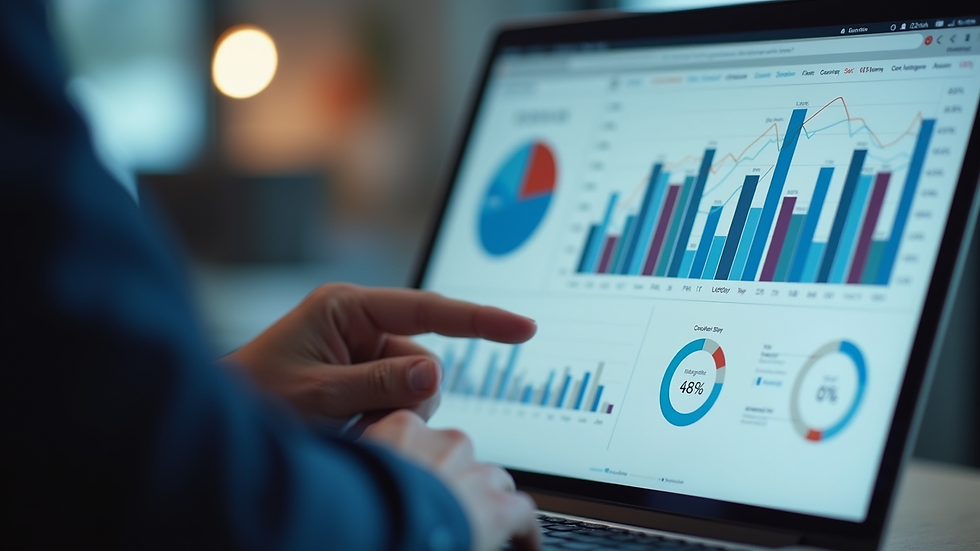Advanced PPC Tactics for Greater Success
- Chris Avery
- Aug 1
- 4 min read
Pay-per-click (PPC) advertising remains one of the most effective ways to drive targeted traffic and increase conversions. However, as competition intensifies, simply running basic campaigns is no longer enough. To truly excel, marketers need to adopt advanced paid search strategies that optimise every aspect of their campaigns. This post explores cutting-edge tactics that can help you maximise your PPC success.
Unlocking the Power of Advanced Paid Search Strategies
To stand out in the crowded digital marketplace, you must go beyond the basics. Advanced paid search strategies involve leveraging data, automation, and creative targeting to improve campaign performance. Here are some key approaches:
Audience Segmentation: Instead of targeting broad demographics, break down your audience into smaller, more specific groups based on behaviour, interests, and purchase intent. This allows for tailored ad copy and bidding strategies.
Dynamic Keyword Insertion: Use dynamic keyword insertion to automatically update your ad text with the searcher’s query. This increases relevance and click-through rates.
Bid Adjustments by Device and Location: Analyse performance data to adjust bids for different devices and geographic locations. For example, if mobile users in London convert better, increase bids for that segment.
Ad Scheduling: Run your ads during peak hours when your target audience is most active. This reduces wasted spend and improves ROI.
Use of Negative Keywords: Continuously refine your negative keyword list to prevent your ads from showing on irrelevant searches.
By combining these tactics, you can create highly targeted campaigns that deliver better results at a lower cost.

How to Make PPC Effective?
Effectiveness in PPC is measured by how well your campaigns convert clicks into customers. To achieve this, focus on optimisation and testing:
Landing Page Optimisation
Your ads should lead to landing pages that are relevant, fast-loading, and designed to convert. Use clear calls to action, minimal distractions, and mobile-friendly layouts.
A/B Testing Ads
Regularly test different headlines, descriptions, and calls to action to identify what resonates best with your audience. Even small changes can significantly impact performance.
Conversion Tracking Setup
Implement conversion tracking to measure which keywords and ads drive sales or leads. Use this data to allocate budget to the highest-performing elements.
Quality Score Improvement
Google rewards ads with high relevance and good user experience by lowering cost per click. Improve your Quality Score by aligning keywords, ad copy, and landing pages.
Remarketing Campaigns
Target users who have previously visited your site but did not convert. Tailor ads to remind them of your offer and encourage them to return.
By focusing on these areas, you can make your PPC campaigns more efficient and profitable.

Leveraging Automation and AI in PPC
Automation and artificial intelligence (AI) have transformed how PPC campaigns are managed. Using these technologies can save time and improve accuracy:
Smart Bidding: Use Google’s automated bidding strategies like Target CPA or Target ROAS to optimise bids in real-time based on conversion likelihood.
Responsive Search Ads: These ads automatically test different combinations of headlines and descriptions to find the best performing versions.
Automated Rules: Set rules to pause underperforming ads, increase bids during peak times, or adjust budgets based on performance thresholds.
AI-Powered Analytics: Use AI tools to analyse large datasets and uncover insights that humans might miss, such as emerging keyword trends or audience segments.
While automation can handle routine tasks, it’s important to monitor campaigns regularly and make strategic adjustments.

Integrating PPC with Other Marketing Channels
For maximum impact, PPC should not operate in isolation. Integrate your paid search efforts with other marketing channels:
SEO Synergy: Use PPC data to identify high-converting keywords that can inform your SEO strategy. Conversely, strong organic rankings can reduce PPC costs.
Social Media Advertising: Coordinate messaging and targeting between PPC and social media ads to reinforce your brand and offers.
Email Marketing: Use PPC to capture leads and nurture them through email campaigns, increasing lifetime customer value.
Content Marketing: Promote valuable content through PPC to attract and educate your audience, building trust and authority.
A cohesive multi-channel approach amplifies your reach and improves overall marketing effectiveness.
Continuous Learning and Adaptation
The digital advertising landscape is constantly evolving. To stay ahead, you must commit to ongoing learning and adaptation:
Stay Updated on Platform Changes: Google Ads and other platforms frequently update features and policies. Keep informed to leverage new opportunities.
Monitor Competitors: Use tools to track competitor ads and strategies. Learn from their successes and mistakes.
Experiment with New Formats: Test emerging ad formats like video ads, shopping ads, or local service ads to find new growth avenues.
Analyse Data Deeply: Go beyond surface metrics and analyse customer behaviour, attribution models, and funnel performance.
By embracing a mindset of continuous improvement, you can maintain a competitive edge.
For those looking to deepen their expertise, exploring advanced ppc strategies can provide valuable insights and practical tools to elevate your campaigns.
With these advanced tactics, your paid search campaigns can achieve greater precision, efficiency, and return on investment. Start implementing these strategies today to unlock the full potential of PPC advertising.